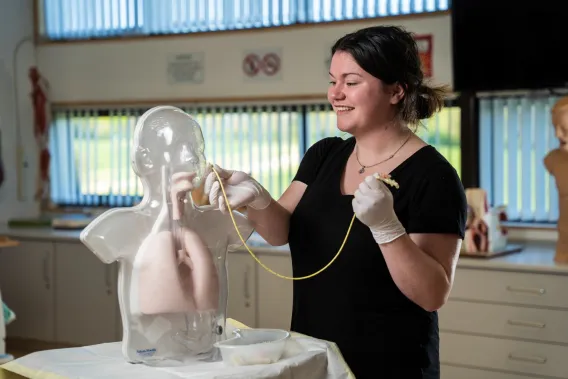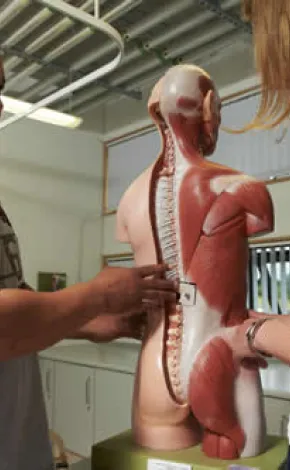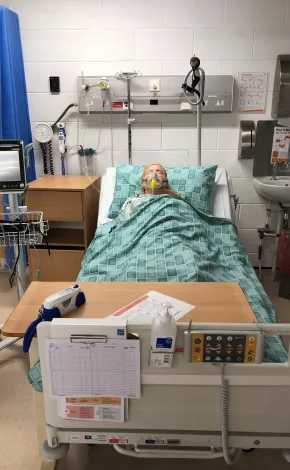
The Clinical Skills Laboratories are simulated clinical environments that provide settings in which students can safely and effectively practice and learn clinical skills. They provide a welcoming and safe learning space for undergraduate nursing and midwifery students and lecturers. A team of four staff members leads the strategic and operational running of the labs. Our clinical skills laboratories are based on the ground floor and first floor of the Health Sciences Building and comprise of:
Midwifery Clinical Skills Laboratory
Nursing Clinical Skills Laboratories
Communication Suite
- Multifunctional Room
- Self-Directed Learning Spaces
- HS1-017 General Nursing
- HS1-018 Midwifery
- HS1-020 Intellectual Disability Nursing
- HS1-021 Mental Health Nursing

The Midwifery Skills Lab is located in HSG008 has evolved into an exciting resource for midwifery learning. The lab simulates a four bedded maternity ward and midwife station which provides a safe environment for students to simulate midwifery practice using simulation resources e.g., midwifery task trainers, mannequins, delivery beds, a resuscitaire and incubator.
Resources support students in enhancing their clinical skills and knowledge in preparation for practice placement opportunities. Clinical skills teaching and learning and simulation provide students with an immersive experience to gain experience, andp build confidence within this midwifery simulated environment.
The area is predominantly dedicated to BSc Midwifery and Higher Diploma Midwifery programmes but is also utilised by other programmes within The School of Nursing & Midwifery.
There are six nursing clinical skill labs - HS1-022, HS1-023, HS1-026, HS1-031, HS1-032 and HS1-035. These labs simulate a hospital or community environment in layout and are equipped with a range of low, medium and high-fidelity teaching equipment.
The layout of each lab is versatile and flexible enabling the teaching of a wide and diverse range of clinical skills. These spaces are dedicated to optimising the teaching and learning experience for students and educators by providing contemporary and flexible learning environments that support the development of clinical skills.
Learning is supported through collaboration with faculty, students and healthcare partners to provide innovative skills based education.
This space is located in HS1-035 and is designed and furnished to reflect community living and comprises a kitchen, living room, bedroom and bathroom area.
Many of the BSc Nursing (Intellectual Disability) and BSc Nursing (Mental Health) programme modules are scheduled in this suite and it is also available to all undergraduate nursing and midwifery programmes.
It provides students with an opportunity for immersion in a simulated real-world home environment and simulates community living.
An additional suite comprises one multi-functional room with four smaller self-directed learning spaces.
This space is designed for flexibility, with no fitted furniture allowing for differing configurations. It is typically used as a teaching room for small groups, a relaxation training room, and for protected reflective time (PRT).
It is also home to multi-sensory teaching equipment and can be adapted to simulate a multi-sensory environment.
The self-directed learning labs are dedicated to student learning and are available to students during teaching hours. Students pre-book the labs and they are typically used for skill practice and exam preparation and audio-visual recording. The labs are equipped with teaching and learning resources specific to each discipline:
-
HS1-017 – General Nursing self-directed learning space
-
HS1-018 – Midwifery Nursing self-directed learning space
-
HS1-020 – Intellectual Disability Nursing self-directed learning space
-
HS1-021 – Mental Health Nursing self-directed learning space

Video Resources

Clinical Skills Lab Gallery

Clinical Skills Team Contact Details

Simulation
In 2023, the Clinical Skills Team was honored with the EHS Faculty Teaching Excellence Award in Pedagogic Support by the Centre for Transformative Learning. At the time, the team included Dr. Liz Kingston, Mairead Moloney, and Dr. Kevin Johnson, whose dedication to innovative teaching and student support earned them this well-deserved recognition.

Contact School of Nursing and Midwifery
Health Sciences Building, North Bank Campus, University of Limerick
Email: nm@ul.ie